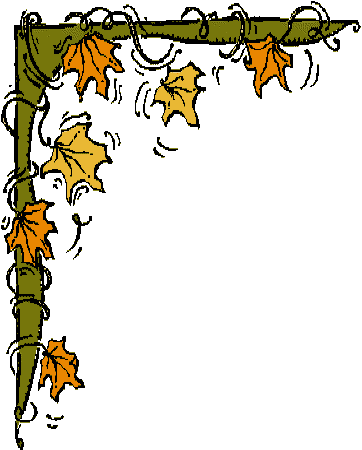
An ancestor
named Gaston
made
several families of
Guay...Gastonguay
written by Robert Prévost
translated to English by Gerald Paul Guay
Note: [..] indicates explanation I have added
There was a time when a given
name [first name] sufficed in identifying people, but when the Middle Ages
arrived, the mix of population and demographic growth made it imperative to
chose a last name [surname]. At the end of the Fourteenth Century, France
already counted ten million inhabitants.
 These surnames, which
were to be family names, had diverse origins:
geographic features Lamontagne - [The mountain], Lariviere - [The river],
professions or trades (Marchand -[shopkeeper], Prevost - [teacher of
prevocational instruction], Mercier - [haberdasher or dealer in men's clothing], personality
Lesage - [wise], Letendre - [gentle], etc. It is
therefore that certain families that lived near a gué (or ford, a shallow place
in a river) would have a similar name? In France there already existed some Gué,
some Legué, and some Dugué. Possibly these distant ancestors, excited with
love of life, wanted to adopt a statement expressing their joy, gué! We don't
find this one in the ancient refrains: the good luck, ô gué!
These surnames, which
were to be family names, had diverse origins:
geographic features Lamontagne - [The mountain], Lariviere - [The river],
professions or trades (Marchand -[shopkeeper], Prevost - [teacher of
prevocational instruction], Mercier - [haberdasher or dealer in men's clothing], personality
Lesage - [wise], Letendre - [gentle], etc. It is
therefore that certain families that lived near a gué (or ford, a shallow place
in a river) would have a similar name? In France there already existed some Gué,
some Legué, and some Dugué. Possibly these distant ancestors, excited with
love of life, wanted to adopt a statement expressing their joy, gué! We don't
find this one in the ancient refrains: the good luck, ô gué!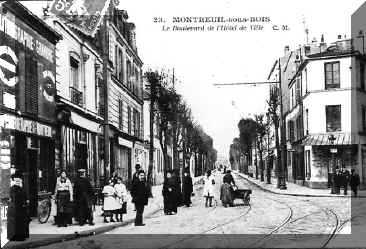
Now that we are pursuing research at Montreuil-sous-Bois, on the close
outskirts of Paris, on our own ancestor Martin Prévost, we have uncovered the
Act of Baptism of <Gaston le guet> [guet translates as watch, lookout] on
September 4, 1630, source of a good portion of us Guay, also our Caston...guay,
but don't worry. This Montreuillois founded a family with Jeanne Prévost,
Martin's sister.
Before traveling to Nouvelle France, [New France, now Canada] the couple
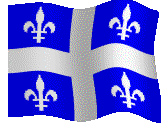 had
baptized at least three children: Mathiew (November 12, 1654), Nicolas (March
21, 1656), and Elizabeth (January 8, 1658). Now, in these three acts, the father
always sees his name spelled a different way, they are <Guier>, <Guié>,
and <Gué>, respectively.
had
baptized at least three children: Mathiew (November 12, 1654), Nicolas (March
21, 1656), and Elizabeth (January 8, 1658). Now, in these three acts, the father
always sees his name spelled a different way, they are <Guier>, <Guié>,
and <Gué>, respectively.
It isn't until after 1658 that the Guay's depart the old France for the new.
The brother of the spouse, Martin Prévost arrived in Québec in 1639 in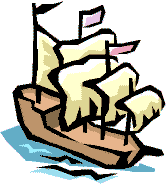 employ
of a shop belonging to Cent-Associés, where he established a residence. He was
the first <Visage Pâle> paleface to set up home with a <Peau Rouge>
redskin and since 1645 was owner of a concession located at the Montmorency
headwater in the Lordship of Beauport. His sister and brother-in-law could well
count on his knowledge of the country to settle in and take roots. Without doubt
industrious, the Guay family rapidly carved a place in the sun. In 1678, Gaston
came to acquire some of the Lordship of Saint-Francois, near Québec. The
following year, his daughter Marguerite married Noël Levasseur, a carpenter, to
whom she would give 14
employ
of a shop belonging to Cent-Associés, where he established a residence. He was
the first <Visage Pâle> paleface to set up home with a <Peau Rouge>
redskin and since 1645 was owner of a concession located at the Montmorency
headwater in the Lordship of Beauport. His sister and brother-in-law could well
count on his knowledge of the country to settle in and take roots. Without doubt
industrious, the Guay family rapidly carved a place in the sun. In 1678, Gaston
came to acquire some of the Lordship of Saint-Francois, near Québec. The
following year, his daughter Marguerite married Noël Levasseur, a carpenter, to
whom she would give 14
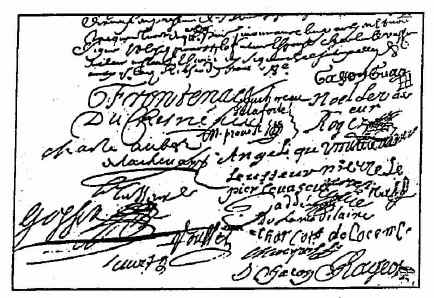 children, though one, named Noël like his father, would
become a master sculptor and well beyond his death, dominated the Canadian sculpture of his time. The family enjoyed an excellent reputation, because the
Count of Frontenac, governor of the colony and his steward Jacques Duchesneau
signed the marriage contract as qualified witnesses in presenting themselves to
the notary Rageot. In the document, he himself wrote Guay.
children, though one, named Noël like his father, would
become a master sculptor and well beyond his death, dominated the Canadian sculpture of his time. The family enjoyed an excellent reputation, because the
Count of Frontenac, governor of the colony and his steward Jacques Duchesneau
signed the marriage contract as qualified witnesses in presenting themselves to
the notary Rageot. In the document, he himself wrote Guay.
At the beginning of 1681, it was Mathiew Guay's turn to establish a home. On
January 12th, he presented himself, with Therese Poirier, daughter of Vincent
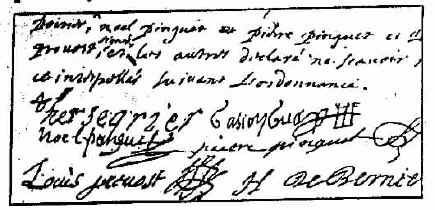 and of Francoise Pinguet to the notary Duquet. His father accompanied him and
very clearly signed the contract <Gaston Guay>, even though the records
stayed as <Gué>. Nine days later, he signed the Act of Marriage in the
same manner and with paraphe.
and of Francoise Pinguet to the notary Duquet. His father accompanied him and
very clearly signed the contract <Gaston Guay>, even though the records
stayed as <Gué>. Nine days later, he signed the Act of Marriage in the
same manner and with paraphe.
From this union were born seven children, of which five were sons. After
being widowed in September 1693, he would conduct Anne Brisson to the altar
three months later, and she was deceased in November 1694 after giving birth to
a son who she had the misfortune of losing. In 1695, Mathiew contracted a third
marriage with Marguerite Balan who would give him 11 children, four of which
were sons.
In 1687, Francois Guay, a brother of Mathiew married Anne Madeleine
Larcheveque; he is a tailor and marshal. Did he receive a fatal blow? He died
one month later at his brother-in-law's Noël Levasseur in spite of the care of
surgeon Timothee Roussel. He left no decendants.
Another of Mathiew's brothers was more fortunate. In June 1691, Jean Baptiste
married Sillery Marie-Agnes Simon, daughter of Hubert and of
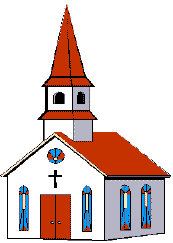 Marie Vié. This
couple would have 11 children, of which four were sons. At this time another
name appeared: <Gastongué>. Therefore, from the birth of this couple's
second daughter, Marie-Louise (1693), the records show daughter of <Jean
Baptiste Gastongué>. It is also the same in the case of two of his sisters,
Marie-Genevieve and Marie Therese, twins born in 1696. From this time forward,
the first name and the family name of the ancestor Gaston were joined so there
was no longer only one and the same surname.
Marie Vié. This
couple would have 11 children, of which four were sons. At this time another
name appeared: <Gastongué>. Therefore, from the birth of this couple's
second daughter, Marie-Louise (1693), the records show daughter of <Jean
Baptiste Gastongué>. It is also the same in the case of two of his sisters,
Marie-Genevieve and Marie Therese, twins born in 1696. From this time forward,
the first name and the family name of the ancestor Gaston were joined so there
was no longer only one and the same surname.
But don't believe that Gaston Guay and Jeanne Prévost are the ancestors of
all the Guay, Gastonguay and Castonguay in America.
Jean Guay, son of Jean and of Marie Dumont, of Berneuil, a borough of the
actual district of Saintes, department of Charente-Maritime, was married in
Québec in 1652 to a Rochelaise, Jeanne Mignon who gave him 12 children, 11 of
which were sons! At least four of them, when the time came, would establish a
home, now going to Rocheron, to Bégin, to Chauveau and to Albert.
Another Jean Guay, called <Leguay>, son of André and of Anne Lamy,
born in Caen in 1643, married Marie Briere in Québec in 1670 both of Normand
origin. She saw the light of day near Pont-l'Eveque, district of Lisieux, in
Calvados. This couple produced a half-dozen children.
It seems right that it was the sons of Gaston Guay who contributed most in
unifying the first and family name of their father, to create a new surname of
Gastonguay or Castonguay; Mathiew and Jean-Baptiste had descendants who would
adopt, some the surname Guay, some Gastonguay.

[Home] [Up] [Gaston Guay] [Armel Guay] [Leonard Babin] [In Search Of...] [In Peru]


![]()